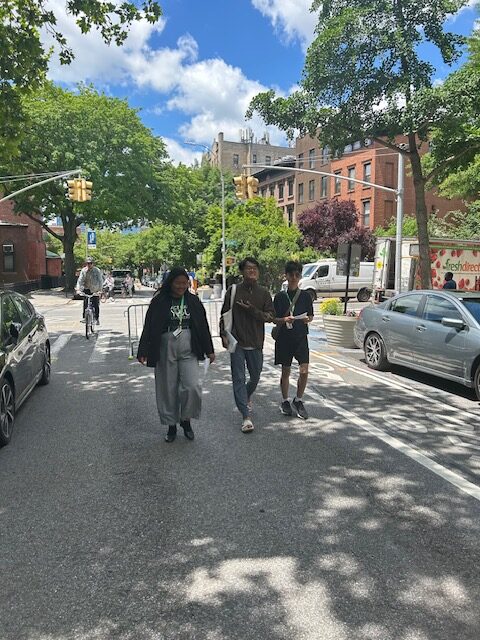Authors: Che Powell (UPM ‘25) + Lauren Goshinski
(L, R) Myanmar students explore Willoughby Ave. Open Street, May 2024. Credit: Sustainable Learning; From Field to Classroom: students bring their observations to life on this poster, ready to share their journey and insights, May 2024. Credit: Sustainable Learning.
Urban Placemaking and Management (UPM) students from Pratt Institute’s Graduate Center for Planning and the Environment (GCPE) recently collaborated with high school students from Myanmar as part of the Sustainable Summer Program, sponsored by the US State Department. Over six weeks, Myanmar students visited various cities around the United States, including New York, to learn about urban sustainability.
Myanmar in Context
“We are very grateful to be able to continue this collaboration. As civil war rages in Myanmar, it is difficult for normal life to continue for the high school students, their teachers, and families. Placemaking can be very helpful in supporting and consolidating communities in times of conflict. Pratt has taught these approaches through courses like ‘Placemaking as Peacemaking’ which explored placemaking as a reparative practice for displaced Syrian refugees in Lebanon and Egypt,” said David Burney, Academic Director of the UPM program. “As communities rebuild, placemaking acts as the armature around which normal social life can be restored.”
About the Sustainable Summer Program
The Sustainable Summer Program, directed by Joanna Johnson, is a leadership initiative focusing on environmental sustainability for high school students. The Myanmar Youth Leadership Program, funded by the State Department and run by PH International and Sustainable Learning, brought ten students and two chaperones to areas including the Hudson Valley in upstate New York, Brooklyn, Vermont, and Washington, D.C. The program aims to cultivate leadership skills while educating participants about climate crisis solutions.

Myanmar Students presenting their field research of Underwood Park to Professor Margaret Walker, May 2024. Credit: Sustainable Learning
Workshop at Pratt Institute
During their visit to Brooklyn, Myanmar students participated in a placemaking workshop led by GCPE Visiting Assistant Professor Margaret Walker with support from UPM ‘25 students Penny Lewis, Che Powell, Cyrus Henry, and Isabel Campbell-Goss. Providing an in-depth exploration of placemaking principles, the workshop began with an introduction to the principles of community-based work which is central to the GCPE curriculum and Urban Placemaking and Management program. UPM students shared their research methods from their 2024 “Placemaking Lab: Analysis of Public Space” studio, which focused on the Open Streets Program in North Brooklyn, taught by Visiting Assistant Professor Emily Ahn Levy and Adjunct Professor Vaidehi Mody. Through sharing this presentation the students were able to gain a comprehensive look at community engagement methods and types of research that are integral in the design, programming and management of Open Streets in New York City.
Hands-On Placemaking Activities & Mutual Learning
The placemaking discipline utilizes a variety of methods and tools to interpret both tangible and intangible assets in a neighborhood, which builds a holistic picture of how residents and visitors use and value different aspects of a particular area, and can also identify where needs may not be fully met. Myanmar students used the Project for Public Spaces (PPS) Place Game which helps analyze public spaces based on criteria such as space uses and activities, comfort and image, access and linkages, and sociability. The students were divided into teams and explored local public spaces, including Willoughby Ave. Open Street, St. James Towers Plaza, and Underwood Park.
Guided by the UPM students, the teams assessed the strengths and opportunities of these public spaces and gathered data through observations and interviews with space users. After their fieldwork, each group prepared a presentation with posters showcasing their findings and recommendations for improving these spaces.

Myanmar Students presenting their research of St. James Towers Plaza with UPM ‘25 Graduate student, Isabel-Campbell Goss, May 2024. Credit: Sustainable Learning
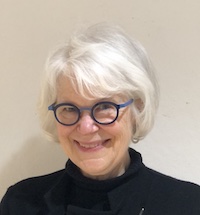
“Hosting the Myanmar students over the past two years has been an exchange in the best sense: we Pratt folks—professors and students—gained just as much from the experience as the high school students. Their enthusiasm to learn about how citizen engagement can transform cities and towns, and their plans to put these ideas to work in their communities, was inspiring. They brought a sophisticated understanding of urban issues, local politics and governance, and an ability to place these issues into the larger, complex context of civil strife in their country. They understood the importance of introducing democracy at the local level and the implications that could have for long-lasting change at the national level.” – Margaret Walker, GCPE Visiting Associate Professor
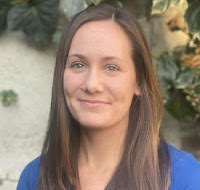
“Participatory Planning with Pratt adds to our exchange experience by providing students with tools and examples they can apply to their own project planning, in addition to providing an opportunity for cultural exchange through group work and mentorship.” – Joanna Johnson, Sustainable Summer Director
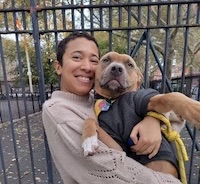
“This workshop was an important reminder that placemaking is for everyone and it happens everywhere. It is not just about the material things around us. The power to be able to connect in person is invaluable and added to the impact of this workshop. The exchange deepened students’ understanding of place and place attachment. Having conversations with the Myanmar students made it clear that despite the distance we are all fighting the same battle.” – Penny Lewis, UPM ‘25
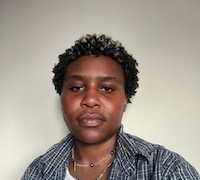
“Participating in this workshop allowed us to share many of the placemaking concepts and techniques that we learned throughout the school year. Being able to answer the students’ questions and connect the work that we are doing here in Brooklyn to the work that the students were doing in Myanmar was a great part of the experience.” – Che Powell, UPM ‘25
Impact and Takeaways
This collaboration offered an invaluable opportunity for cultural exchange and mutual learning that demonstrated the practical application of academic research, and underscored the importance of bringing global and intergenerational perspectives together to address environmental sustainability. Through hands-on learning and cultural exchange, the workshop deepened all participants’ understanding of placemaking’s role in creating more sustainable and equitable urban spaces worldwide.
